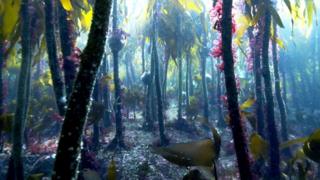

Scientists have discovered kelp off the coast of Scotland, Ireland and France that has survived since the last ice age, around 16,000 years ago.
Experts from Heriot-Watt University’s Orkney campus analysed the genetic composition of oarweed from 14 areas across the northern Atlantic ocean.
The team found three distinct genetic clusters.
It is hoped the discovery could help show how marine plant life survives extreme changes in climate.
Dr Andrew Want collected samples from Kirkwall Bay, near his home.
The marine ecologist said the “refugee populations” managed to hang on and survive “amid dramatic changes”.
Dr Want, who is based at Heriot-Watt’s International Centre for Island Technology in Orkney, said: “Oarweed in Scotland and Ireland is more closely related to populations in the high Arctic than to the Brittany cluster.
“As the ice sheets retreated from northern European shorelines at the end of the most recent ice age, oarweed distribution followed and recolonised the higher latitudes of the Atlantic.
“Kelp plays a critical role in the Atlantic so it is important to understand what affects its distribution and survival over time and how sensitive it is to change.”
The research team, which included academics based in Portugal and France, found one distinct genetic cluster along the eastern seaboard of Canada and the US.
Another was discovered in central and northern Europe and a third compact population around Brittany.
Dr Want said the “Brittany population” is once again close to the other populations but has managed to remain distinct.
He added: “Worryingly, this unique Brittany gene pool is projected to disappear under greenhouse gas emission scenarios.
“This provides further evidence of the loss of biodiversity expected with rapidly changing marine temperatures.”
The team’s findings have been published in the European Journal of Phycology.
Dr Joao Neiva, from Algarve’s Centre of Marine Sciences, said: “Our study shows how marine organisms adjust to shifting climates by migrating polewards and even across the Atlantic when conditions are favourable.
“These migrations provide a mechanism by which marine life buffers the effects of global climatic shifts, and how they can compensate for predictable contractions at warmer limits as the modern climatic crisis unfolds.
“While the species may not be threatened at global scales, range contractions can have very negative impacts if vanishing ranges are composed of unique and diverse populations.
“This is certainly the case off the coast of Brittany.”
Read MoreFeedzy
Discover how to choose the right chain sling, from single-leg to quad-leg and adjustable slings,…
Secure your RV with the right storage facility. Explore local options to protect your investment,…
What is milk pasteurization, is it important, and should it matter to you? Here's the…
Learn what happens when you weld materials too quickly or too slowly, and why balancing…
Avoid injury and equipment damage with these five tips, including organizing your garage better, anchoring…
Avoid costly freight damage with the right securement system. Get expert tips for blocking, bracing,…